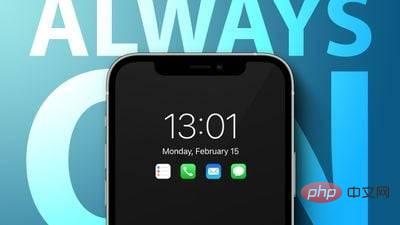
Last year’s iPhone 13 Pro models were the first of Apple’s smartphones to feature a 120Hz ProMotion display, and while the two iPhone 14 Pro models will continue to use the technology, their screens will have refresh rates this cycle. Transsexuality is likely to expand.

To bring ProMotion displays to iPhone 13 Pro models, Apple used LTPO panel technology with variable refresh rates, resulting in a more energy-efficient backplane - responsible for opening and turn off individual pixels. In this way, ProMotion is able to dynamically produce fast frame rates when the user needs it, while preserving battery life when not.
On the iPhone 13 Pro and Pro Max, however, Apple's ProMotion display is limited to adjusting the screen refresh rate between 10Hz and 120Hz. This is in contrast to the LPTO panels used by the likes of Oppo and Samsung, which can drop down to 1Hz when viewing static images or when the device is inactive.
"Expect" the ProMotion displays used in the iPhone 14 Pro and iPhone 14 Pro Max to drop to the same 1Hz low. Depending on which approach Apple decides to take, the technology could pave the way for longer battery life or always-on display elements.
For example, Apple Watch Series 7 models use LTPO displays, which allows them to have the same up to 18 hours of battery life as earlier Apple Watch models, even though they have always-on displays. Similar to LTPO-equipped Android phones, the same technology on the iPhone can display the time, date and any notifications on the screen at any time without having to unlock the phone.
Apple could have brought similar functionality to the iPhone 13, but that didn’t happen. Currently, there are no reliable leaks suggesting that the iPhone 14 Pro models will feature always-on display. However, that doesn't mean Apple won't surprise us. In fact, if Apple expanded the refresh rate variability of its ProMotion displays, there would be no technical limitations stopping it.
The above is the detailed content of iPhone 14 Pro screen refresh rate upgrade enables always-on display. For more information, please follow other related articles on the PHP Chinese website!
 Mobile phone root
Mobile phone root
 Projector mobile phone
Projector mobile phone
 The phone cannot connect to the Bluetooth headset
The phone cannot connect to the Bluetooth headset
 Why does my phone keep restarting?
Why does my phone keep restarting?
 The difference between official replacement phone and brand new phone
The difference between official replacement phone and brand new phone
 Why does my phone keep restarting?
Why does my phone keep restarting?
 Why can't my mobile phone make calls but not surf the Internet?
Why can't my mobile phone make calls but not surf the Internet?
 Why is my phone not turned off but when someone calls me it prompts me to turn it off?
Why is my phone not turned off but when someone calls me it prompts me to turn it off?




